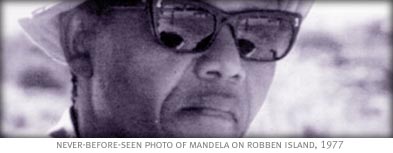 | |||
Synopsis | |||
 As Nelson Mandela prepares to step down as president of South Africa, FRONTLINE presents a deeply personal biography of one of the great figures of the 20th century. "The Long Walk of Nelson Mandela" tells the story of the man behind the myth, probing Mandela's character, leadership and life's method through intimate recollections with friends, political allies, adversaries, and his fellow prisoners and jailers on Robben Island where Mandela spent 18 of his 27 prison years. It's a two-hour biography filled with insights: from Mandela's 'royal' upbringing in the rural Transkei where old chiefs still remember him as a young boy and where his values and attitudes were shaped by tradition and royal prerogative--to old colleagues' anecdotes about his self-discipline, guarded privacy and quite early sense of his own historic destiny. A major part of "The Long Walk of Nelson Mandela" probes how Mandela transformed himself in prison from an impetuous, risk-taking radical into a mature leader and statesman. On Robben Island he became the master of his own prison; through intelligence, charm and dignified defiance he bent to his will even the most brutal prison officials. And from this he took a great lesson, says Richard Stengel, co-author of his memoirs: "He realized that the relationship between him and his Afrikaans guards was a microcosm for the whole South African experience. If he could somehow come to some modus vivendi with his guards, then he could maybe bring South Africa to the promised land. " The program also examines Mandela's electric relationship with Winnie Madikizela Mandela--a love story tragically tempered by the political ambitions of its two larger-than-life protagonists. And, it chronicles Mandela's negotiations with the increasingly embattled white rulers. At first, Mandela chose not to tell his ANC comrades about the secret talks and some accused him of selling out when they heard the news. Later, after the freed Mandela and F.W. deKlerk had negotiated a new democratic South Africa, they had bitter confrontations over the black-on-black violence in the townships that had been formented by a government force. Together with the many interviews, the program also interweaves analyses from Mandela's biographers, Richard Stengel and Anthony Sampson. They illuminate not only what separates Mandela from ordinary men--his singular pursuit of his life's mission, his unwavering moral certitude, his own sense of his destiny-- but also, what makes him like the rest of us: his vanity, his anger, his stubbornness. Drawing throughout this story on unique photos and rare archival film (including never-before-seen footage of Mandela on Robben Island in 1977), "The Long Walk of Nelson Mandela" concludes with contemporary scenes of an historic moment for both Mandela and his new nation. At the start of the 1995 Rugby World Cup in Johannesburg, Mandela donned the jersey of the national team and came out on the field as tens of thousands of mostly white fans roared--"Nelson, Nelson." The event was one of the most remarkable pieces of political theater ever staged. The white players say they won the game for Mandela. It unleashed a flood of emotion that swept over every corner of the country. "It was the crossing of another Rubicon. Only Mandela could wear an enemy jersey." says ex-political prisoner Tokyo Sexwale. "The liberation struggle of our people was not about liberating blacks from bondage, it was about liberating white people from fear. And there it was, fear melting away."
synopsis + anecdotes + chronology + discussion + map tapes tapes & transcripts + transcripts + credits + press + site map + viewers & teachers' guide frontline + pbs online + wgbh web site copyright WGBH educational foundation
| |||